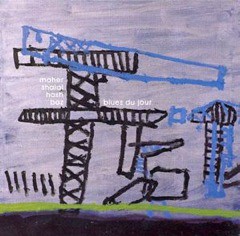Jackie-O Motherfucker - Fig. 5 download
download"In America, we have monuments instead of mythology: bright obelisks and classical statuary erected as perpetually new in the place of the perpetually old. This is, after all, the New World; we dedicate these talismans against ruin across the landscape almost as if to keep history itself at bay, to keep time from catching up with us. Underfoot are bones and detritus, though, the debris of the little nameless events that are excluded from American history. It's all a rather shallow grave when you think about it.
Jackie-O Motherfucker's unprecedented Fig. 5, the group's first CD release, presents a dim and unsettling archaeology of American music. Released in the wake of the American century, it's the first unapologetically brilliant piece of experimental music I've heard this year. Somehow constructed bereft of any postmodern irony, Fig. 5 transforms a commanding grasp on the celebrated tributaries of American music-- jazz, Appalachian folk, soul, African-American spirituals, West coast surf-rock, Protestant hymns, Louisville post-rock, bluegrass, electronic noise-- into an autochthonous gospel. Jackie-O Motherfucker-- two multi-instrumentalists, Tom Greenwood and Jef Brown and the cadre of eclectic talents with whom they surround themselves-- abandoned the remix loop jazz-fusion of their first two albums (available only as LPs) and literally emerged from the basement and the soil with a masterpiece.
The gust-blown digital hum of the first track, "Analogue Skillet," underpins plucked and scraping strings, like a bow on the nervous system itself. It's buzzing neon yielding to something like a screen-door creaking on its rusted hinges behind wind chimes in "Native Einstein," a kind of front porch minimalism. There's a faint chorus of young girls counting down in the recesses, playing Double Dutch in the road. The strings sound like saws; the lone sax whines like an animal. The scene is replaced by the solemn repetition of guitar twang; "Your Cells are in Motion" is the working man's Mogwai: a funereal procession of rising guitar and faint vocals coalescing steadily into shantytown post-rock, tarnished but true. Labradford will spend the entirety of their career trying to create this song and never get it right.
The choral "Go Down, Old Hannah," performed here by the Amalgamated Everlasting Union Chorus Local #824, is a prison camp work song dating back to the turn of the century-- a plea for sunset to end the workday. "Amazing Grace," the slave trader John Newton's ubiquitous 1779 hymn to God, is barely recognizable as Appalachian free jazz: steely banjos and twittering horns that sound like bagpipes are equal parts mountain folk and Pharoah Sanders.
The lilting "Beautiful September" provides an interlude of catchy No Depression dream-rock. But the album's centerpiece is clearly the tribal 24-minute "Michigan Avenue Social Club," a track that sounds at times like dismembered Gershwin, and at other times like Cul de Sac with horns. Fig 5. fades out on the brief, chirping "Madame Curie," dissolving into the earth from which the whole work arose.
For all its disparate strands, Fig. 5 is surprisingly cohesive, constructing some ratcheted new sound with junk and memory rather than laundering old sounds with the irony and veiled contempt of other pastiche exercises. The disc itself is packaged in an oddly fascinating die-cut cardboard folio, complete with snippets of Alan Lomax's celebrated American ethnomusicology. Fig. 5 is slow and plodding like time itself. This work, again, simply has no precedents. Or rather, its precedents lie in the dusty anonymities of American musical history, instead of the proud and touted monuments of our cultural past. Listen to it once if you can. It is our secret national anthem."
sounds like: road trips, porches






